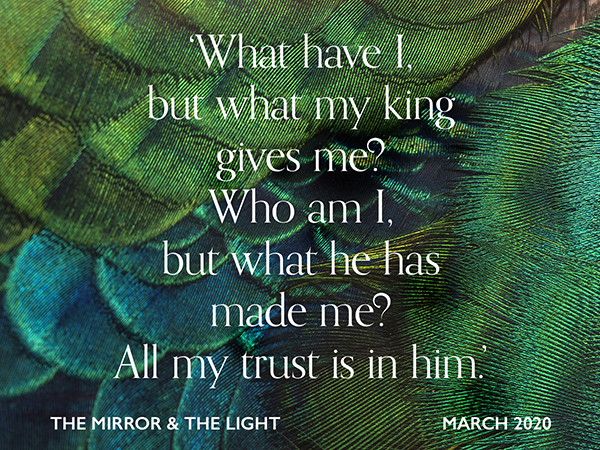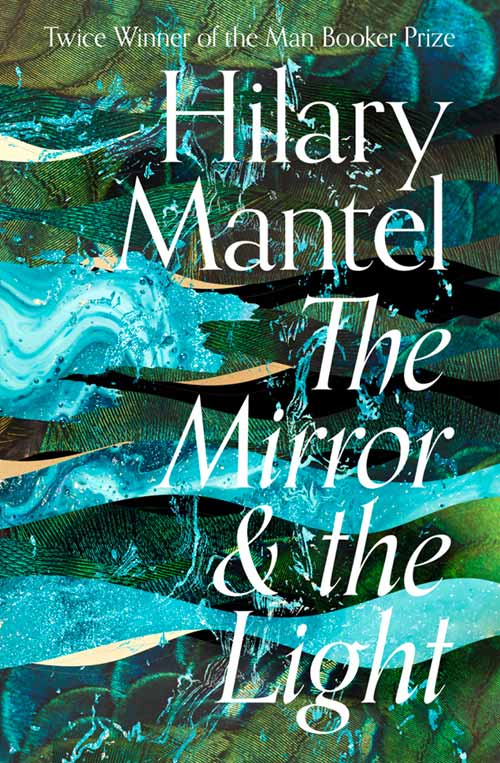There are few figures in British history as universally reviled as Thomas Cromwell. Held responsible for the suppression of the monasteries, the destruction of countless priceless books deemed too ‘popish’ and the attacking of statues, shrines and rood screens across the country, Cromwell has traditionally been viewed as a reforming bulldozer, manipulating the King’s hand to achieve religious changes against the Catholic Church at any cost.

Hilary Mantel, however, described in a 2013 Times interview her own discovery of Cromwell, many years before, in a contemporary account of Cromwell at Wolsey’s palace, weeping over a prayer book:
It is one of those things lying around in the pages of history. Every historian who describes that scene quotes from the original source. But none of them have realised that it is All Souls’ Day, the day of the dead, so when he is crying, he may be crying for more than one thing, she says. ‘An historian will say, “We hear you, Cromwell, you are crying because Wolsey has come down and your career is under threat.”’ But there is usually more than one reason for such a dramatic display of feeling. The novelist says, ‘And what else?’ And you realise that within the last couple of years he has lost most of his family, and this is the day that you remember them.
Having written repeatedly about major figures in history, she reminded herself that ‘the question always about history is, “Who is telling me this and why would they want me to believe it?” If someone has been consistently demonised you want to ask why, and if there could be another story.’ In fact, so insistent was she that Cromwell was a far more interesting figure than history had traditionally depicted, that she worried another author would get there first. ‘I kept thinking someone else would write the Cromwell book, because it seemed to me a very powerful story that changed everything we thought about the Tudor court. Cromwell has been such a peripheral character in fiction and in drama. If you put him centre stage, all this familiar stuff looks completely different. I was sure somebody else would beat me to it.’
Cromwell has of course been depicted many times before. In the 1960s, the films Anne of the Thousand Days and A Man for All Seasons both portrayed Cromwell as ruthless, untrustworthy and vindictive, while in the 2007 television series The Tudors Cromwell displays a fiery reformist’s zeal. He has appeared in countless books, series and films covering the rich historical era of Henry VIII, the man with saintly Thomas More’s blood on his hands, but not until Mantel’s books has he been regarded with such humanity and compassion.

In a British Academy panel discussion in 2015 with Diarmaid MacCulloch, Mantel described what she was doing with her Thomas Cromwell, explaining that previously he was ‘not the sum of historical facts, but the sum of prejudices. Information, disinformation, rolling on, from generation to generation among popular historians, amongst novelists and dramatists, unquestioned, unchallenged.’ Discussing whether her version is more or less ‘accurate’ than a historian’s, she explained the difference between the two types of portrayal:
Popular historians, I think, are very much in the business of judging, issuing moral report cards on people, and academic historians who have a different view of Cromwell are in the business of evaluation, placing people, holding the backdrop steady and evaluating him. A novelist can’t do either of those things. Your backdrop as a novelist is never still, because you are in the present moment with the people, there is nowhere you can stand to judge or evaluate. What the novelist does is try to wipe the slate clean, and say, ‘You don’t know this man, but you’re about to meet him.’
As the figure responsible for the King’s strengthened authority in the North, an English-language Bible in every sixteenth-century church, increased stability in Wales and attempted economic and social improvements like poor-relief legislation, it is difficult now to view Cromwell simply as a power-hungry villain. Indeed, much of the fascination of Mantel’s books is that his motives are never entirely clear, even to himself. Is he driven by ambition? Revenge? Fear? Compassion? Ego? To Mantel, it’s obvious. Just like every- one else, it’s a mixture of them all. At the BA panel discussion, she clarified: ‘I have to portray the inner man … the world almost of unconscious motive, the Cromwell that Cromwell doesn’t know, because he’s made up like all of us of what he was, what he is in the present moment, and what he hopes to be.’

At the 2012 Edinburgh Book Festival, Mantel reminded the audience that her aim is to put the reader directly into those moments of history. ‘The essence of the thing is not to judge with hindsight, not to pass judgment from the lofty perch of the twenty-first century when we know what happened. It’s to be there with them in that hunting party at Wolf Hall, moving forward with imperfect information and perhaps wrong expectations, but in any case moving forward into a future that is not predetermined, but where chance and hazard will play a terrific role.’
Ultimately, she recognised that Cromwell’s success led to his undoing, an undoing that the King repeatedly regretted in subsequent years. Mantel proposed that beyond all the rumours and myths, after a certain point in Cromwell’s career there was one unassailable compulsion at work. ‘Once you’ve begun climbing that ladder, you can’t stop, there is no point where you can balance. You just have to keep on climbing, when people are shaking the foot of it all the time, so very often – people have to remember this when they apply The Revolutionary Nature of the Books hindsight and moral judgments – at the root of it, it’s simply a question of survival.’
The Mirror and the Light is out now.

